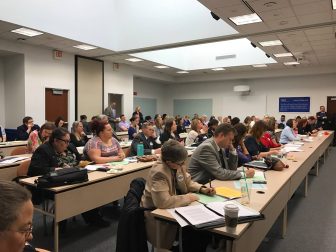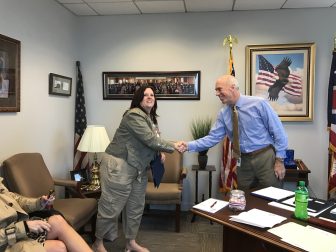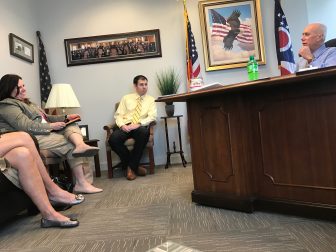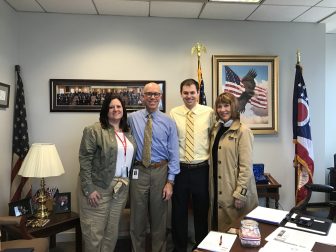Statement from the Ohio Education Association on the House budget
COLUMBUS – April 25, 2017 – “We appreciate the addition of $90 million in education funding in the House budget given the tight revenue situation, and we are glad the House listened to the voices of educators and removed the unnecessary and unworkable teacher ‘externship’ proposal,” said OEA President Becky Higgins. “We look forward to continuing to work with members of the House and Senate to ensure equitable and adequate funding for all students, no matter their zip code or family income.”
“We also encourage the House and Senate to address Ohio’s looming graduation crisis by incorporating the recommendations of the Graduation Requirements Work Group and State Board of Education in the budget.”
The Ohio Education Association (ohea.org) represents 123,000 teachers, faculty members and support professionals in Ohio’s public schools, colleges and universities
Follow OEA @OhioEA on Facebook, Twitter, YouTube, Instagram, and Pinterest.
April 2017 Ohio Schools
- IN THIS ISSUE
- Lancaster educators advocate for student success by making sure kids have breakfast at school
- Huron County locals join together to host a booth at the fair to connect with the community, each other, and to support public education
- Legislative update, Association news, and more
Moved recently? Contact the OEA Member Hotline to update the address on file at 1-844-OEA-Info (1-844-632-4636) or email, membership@ohea.org. Representatives are available Monday-Friday, from 8:30 a.m. to 6 p.m. | OhioSchools — Past Issues
![]()
![]() Oh Yes, We’re Social — Join the Conversation!
Oh Yes, We’re Social — Join the Conversation!
![]()
Spring Break 2017: Where the Legislators Are
If I’m being completely honest, I was only half-joking when I asked friends to have bail money ready for Spring Break, and it wasn’t because I was going to relive my college spring breaks in Daytona Beach. I was attending my first OEA Lobby Day, and I anticipated the meetings getting a bit intense. I was worried about my ability to censor myself and keep my temper in check.
 Instead, I had a very positive experience, and my conversations felt productive. No bail money needed.
Instead, I had a very positive experience, and my conversations felt productive. No bail money needed.
When my colleague and I got to OEA, we were briefed about various issues we might want to discuss with our legislators (we had scheduled meetings ahead of time). Those issues included the Governor’s proposed budget, which includes problems with charter schools getting more money per student than traditional public schools (and a student’s home school district having to make up the difference) and the infamous externship proposal. We were also given talking points about a bill being introduced that would expand Ohio’s voucher program. Other topics for discussion were the preponderance of tests, the rigor of the new graduation requirements, and the possible revisions to the teacher evaluation system.
Along with some colleagues, I met with State Senator Frank LaRose, Representative Tim Ginter, and an aide for State Senator Joe Schiavoni.
 Although I went in prepared for battle, the two legislators and the aide with whom I talked seemed genuinely interested in what I and my colleagues had to say. Two of the three took notes. Representative Ginter, in particular, seemed legitimately interested in how I would propose solving the problems I brought to his attention.
Although I went in prepared for battle, the two legislators and the aide with whom I talked seemed genuinely interested in what I and my colleagues had to say. Two of the three took notes. Representative Ginter, in particular, seemed legitimately interested in how I would propose solving the problems I brought to his attention.
I made two recommendations to him. First, ask the teachers. The Governor seems to think that teachers don’t understand what job skills our students will need in the work force, which is why he proposed the externship plan. However, the committee who came up with that proposal included not one teacher. Any teacher could have told him that the idea might work very well for some teachers and content areas, but would not be the most effective use of time for many others.
When Representative Ginter pointed out that only a very small percentage of Youngstown’s students graduated high school ready for college, I told him that this was almost certainly not due to the teachers’ lack of ability or desire for their students to do well. I can’t speak to the challenges facing Youngstown City Schools, but I am sure the Youngstown teachers could. Likewise, I have ideas that might address some concerns in my own district, but those proposals would not necessarily work in Youngstown. Each district has its own set of challenges, and no one solution will effectively address those concerns across the board. How do we deal with so many diverse situations? Ask the teachers. They will know better than any outsider what ideas might work well in their district.
 My second recommendation to Representative Ginter was to get as many legislators as possible in the schools. Each legislator could see what is working well and what is an area of concern in the school he/she visits. Not only would they see the vast differences in the schools across the state, but they would be able to talk with teachers and witness for themselves both the challenges and the successes of a typical day in the life of a teacher. I am sure that this would be illuminating for them as they work on policies and legislation affecting public schools.
My second recommendation to Representative Ginter was to get as many legislators as possible in the schools. Each legislator could see what is working well and what is an area of concern in the school he/she visits. Not only would they see the vast differences in the schools across the state, but they would be able to talk with teachers and witness for themselves both the challenges and the successes of a typical day in the life of a teacher. I am sure that this would be illuminating for them as they work on policies and legislation affecting public schools.
Participating in Lobby Day reminded me of some important aspects of the world of politics. First of all, legislators, even those from the opposite political party as mine, are not the enemy. It’s not “us vs. them,” although it felt that way to me prior to meeting with a few of my representatives in person. I am hopeful that every time they meet with teachers, having that brief personal connection and hearing our stories allows them to eliminate any adversarial mentality they may have as well.
Secondly, I realized how daunting it must be to be tasked with representing people from all walks of life. While education is always first and foremost in my mind, legislators must deal with issues that impact teachers, factory workers, doctors, business people, parents, children, college students, retirees, the wealthy, the poor, the sick, the well. This is why meeting and speaking with our elected officials is so important.
 Teachers care about all of their students, but the ones we remember most are not the ones who sit quietly in the back of the room not drawing attention to themselves. We remember the kids who engage with us, who let us get to know them. We remember the loud mouths, the rabble-rousers, the ones who make us laugh, and the ones who make us cry. We must be these people to our elected officials. We must become more than a few pages of a 3000-page budget. We must become faces and stories. We must draw attention to our needs by using our expertise to help our representatives make decisions. Phone calls and emails are wonderful and far more practical than a road trip to Columbus for most of us. However, I am convinced that a face-to-face meeting in which we can share our stories and discuss our concerns is the best way to impact those whose decisions affect our jobs and our students.
Teachers care about all of their students, but the ones we remember most are not the ones who sit quietly in the back of the room not drawing attention to themselves. We remember the kids who engage with us, who let us get to know them. We remember the loud mouths, the rabble-rousers, the ones who make us laugh, and the ones who make us cry. We must be these people to our elected officials. We must become more than a few pages of a 3000-page budget. We must become faces and stories. We must draw attention to our needs by using our expertise to help our representatives make decisions. Phone calls and emails are wonderful and far more practical than a road trip to Columbus for most of us. However, I am convinced that a face-to-face meeting in which we can share our stories and discuss our concerns is the best way to impact those whose decisions affect our jobs and our students.
Speaking of students, I can’t wait to tell my classes about my experience in Columbus. Teachers aren’t the only ones who can make appointments with politicians and take road trips to the State Capitol. And the more we can teach our students to speak up for themselves and issues about which they are passionate, education-related or not, the better the future will be for all of us. Maybe next Spring Break, some of my students will road trip to Columbus as well.

Save
Save
Save



